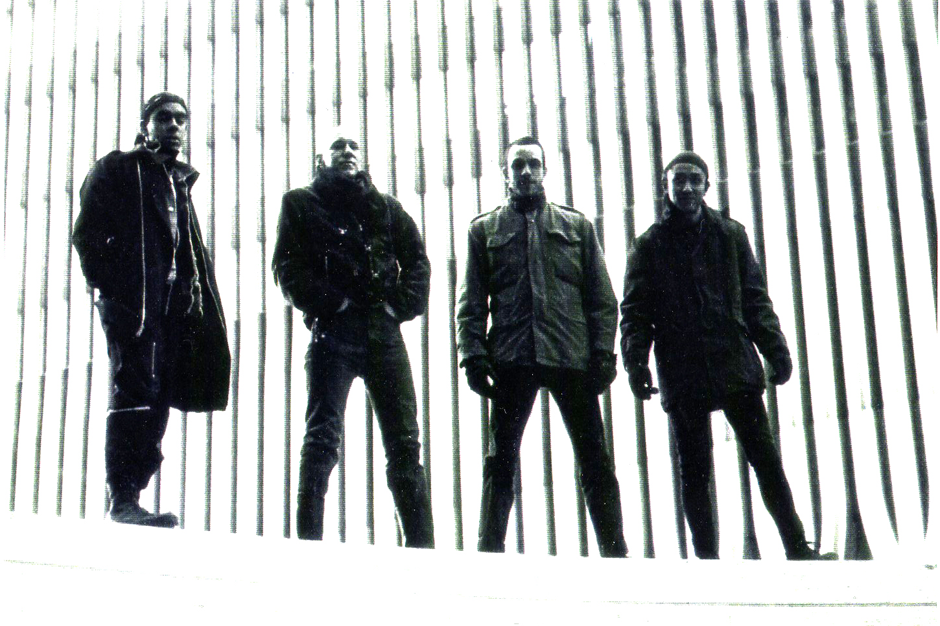Say what you will about the film itself, but if you’re a fan of surreal casting, Johnny Mnemonic is the gift that keeps on giving. Starring Keanu Reeves, Dolph Lundgren, Takeshi Kitano, Udo Kier, Ice-T, and Henry Freaking Rollins — not to mention painter/sculptor Robert Longo in the director’s seat and William Gibson adapting the screenplay from his own fiction — the film makes for an easy trump card in any game of Six Degrees of Kevin Bacon.
It’s surprising, though, given Longo’s roots in New York’s deeply entwined art and music scenes of the 1970s and 1980s — one of his drawings adorns the cover of Glenn Branca’s The Ascension, and he played in Rhys Chatham’s Guitar Trio — that the film’s music wasn’t edgier. Alongside cuts from Orbital and KMFDM, there were songs from downtown staples Cop Shoot Cop and Helmet, but by 1995, those bands had moved a long way from their grimy roots. Add in filler from Stabbing Westward and Bono and the Edge, and the soundtrack became eminently forgettable. (The score itself came from the Hollywood composer Brad Fiedel, of The Terminator, Terminator 2: Judgment Day, Gladiator and dozens of TV movies with titles like Cocaine: One Man’s Seduction.)
Now, however, London’s Blackest Ever Black label, home to post-industrial techno from Raime and Regis, has unearthed a very different selection of music created for Johnny Mnemonic, but never used in the film. Those sooty, apocalyptic songs are part of Now I’m Just a Number: Soundtracks 1994-95, an anthology of the work of New York band Black Rain.
Based on New York’s Lower East Side in the late 1980s and early 1990s, Black Rain fit in with the neighborhood chaos fostered by peers like Missing Foundation — taking an industrial sander onstage with them at squat parties, or playing Tompkins Square Park on the anniversary of its 1988 riot, phalanxed by angry cops and with a pile of scrap metal at the band’s feet, for the equally agitated audience members to wield as they wished. In 1993, Black Rain shared the stage with GG Allin, in what would be his final show before overdosing on heroin.
Like the neighborhood, the group’s lineup was always in flux, but at its core were Stuart Argabright, a former member of Factory-issued post-punks Ike Yard, freestyle one-hit wonders Dominatrix, and the Rammellzee-related hip-hop project Death Comet Crew, alongside Shinichi Shimokawa, another Death Comet member. They’d worked with Longo since 1984; Argabright had been acquainted with Gibson since looking up the author in the telephone book and calling him out of the blue after reading a review of Neuromancer in the Village Voice.
Even before Longo brought Black Rain on board for Johnny Mnemonic, the band’s connection with Gibson had led them to record music for an audio-book version of Neuromancer. “I had been inspired by Gibson’s works and working in his zone for 10 years by Johnny Mnemonic,” says Argabright, in an email.
Working on music for Longo’s film, Black Rain didn’t have Keanu’s face for inspiration, which might explain why the band’s cues are so much more nuanced than the facial expressions of the future Neo (and the former Ted). Murky tones swirl over prickly, drum-machine rhythms; the music’s dystopian air is suggestive of the landmark 1994 compilation Ambient 4: Isolationism, whose subtitle birthed an entire sub-genre of apocalyptic electronic music.
“Shin and I worked at his apartment on Avenue B with a few pieces of gear, pedals,” writes Argabright. “No images had been produced when we did the sounds, but we had the extensive experience of doing the Neuromancer audio book’s many scenes only months before, and so we were ‘in the mode.’ We had extensive Tokyo and Hong Kong experience by then, as well, so we made titles and pictures, then music in our heads straight from the books.”
Once Sony took a financial stake in the film, however — “They expected the next Keanu Reeves movie to be a hit like Speed was, says Argabright — Black Rain’s material got left on the cutting-room floor in favor of songs from Sony artists. (One track, “Memory Johnny Ska Yakuza Firefight,” did make it onto the Japanese version of the CD.)
Now I’m Just a Number brings together one song from the Neuromancer audio book, “Tokyo Night City,” with material for Johnny Mnemonic and other recordings from the period; all the tracks are culled from Black Rain’s 1995 CD 1.0 (Fifth Colvmn Records), long out of print and now trading at obscene prices on Discogs. The album’s atmosphere evokes both 1980s industrialists like Cabaret Voltaire and present-day merchants of doom like Regis and Sandwell District; the various versions of “Lo Tek,” with its slow, deliberate pace and grey-scale sonics, sound almost uncannily like the current output of London’s Raime, the latter-day goths who anchor the Blackest Ever Black label.
“I had known Stuart for a while before I ever heard Black Rain,” says Blackest Ever Black’s Kiran Sande. “We first spoke in late 2010, soon after the release of Raime’s debut EP. Stuart got in touch, out of the blue, to say he’d heard the record and how much he liked it. This was particularly mind-blowing for Raime, who have been Ike Yard obsessives for years. We kept in touch with him, meeting up with him when he visited London, and now and then he sent us old and new recordings he’d made. One day, apropos of nothing, he sent me one of the Black Rain tracks; I listened to it and completely lost my shit. He told me it was from an album of similar stuff [1.0], which I immediately got hold of. I was overwhelmed by what I heard, and particularly struck by the percussive similarities it had not only to Raime, but to a lot of contemporary music that interests me.”
Now I’m Just a Number is just the latest attempt to introduce a new generation of listeners to Argabright’s various projects. Acute Records, a No Wave re-issue sub-label of Carpark, released the Ike Yard anthology 1980-82 Collected in 2006, and plans are in the works for a reissue of the band’s 1982 Factory LP, along with a string of tour dates this fall. In the meantime, Argabright will be playing at New York’s Unsound festival on April 21; the tracks he sent me in anticipation of his performance suggest a state of things coming full circle. The music’s smudged beats and charcoal hues, more digital than the dusky racket he whipped up with Ike Yard, sound newly inspired by the very artists on the Blackest Ever Black roster that modeled their own music on Argabright and his peers’ death disco. It’s six degrees of post-industrial techno, set into an infinite feedback loop.





